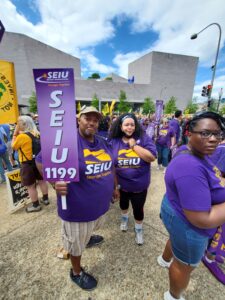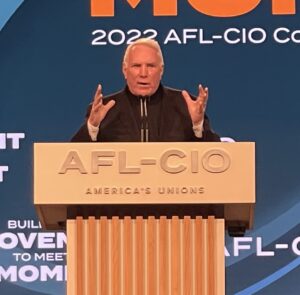Aside from the elderly and retired who are most likely to suffer fatal complications, the covid-19 pandemic and its economic consequences have struck no segment of American society harder than the American working class. It was a grim irony, therefore, that federal social distancing guidelines expired quietly on May 1, the Feast of St Joseph the Worker – because for American workers, the hurt is just beginning. The guidelines were replaced by a set of recommendations to governors of the various states, who must make the decision which enterprises remain closed in the interest of public safety and which are permitted to reopen in the interest of economic recovery.
How have workers been specially impacted by covid-19? On the one hand are several categories of workers who remain on the job and face excessive risk of exposure to the virus. Bus drivers, supermarket cashiers, and especially health care workers continue to serve the public and consequently risk infection every time they greet a passenger, accept a payment or move a patient. On the other are those who work in crowded production and distribution facilities, from meatpacking plants to Amazon distribution warehouses. Though not exposed to the public, the infection of a single worker can rapidly spread across the shopfloor – as has been witnessed repeatedly at pork and chicken processing facilities. Despite calls from trade unions and occupational health experts, OSHA has made no effort to issue an Emergency Temporary Standard covering covid-19 safety hazards in the workplace, leaving workers on their own. Unions like the UFCW (groceries and meatpacking), SEIU and NNU (health care), and ATU and TWU (mass transit) are among those who represent large numbers of workers at elevated risk of infection.
On the other hand are tens of millions of workers who have been forcibly idled by the shutdown. As of the end of April, some 30 million workers had filed for unemployment benefits, with the official unemployment rate nearing 15% (the true rate is almost certainly far higher, as this number does not include those who have given up looking for work out of despair). Layoffs and furloughs have disproportionately fallen on the working classes: many college graduates who usually work in offices have transitioned to doing their jobs from home via the internet, but that’s not available to a high school graduate working in a factory or restaurant. While about 8% of college graduates are reported as unemployed, about one in five of those with a high school diploma or less have been sidelined. The impact has been especially hard on those employed by airlines, hotels, food service, and entertainment venues, where most of the jobs vanished overnight. Unions such as UNITE HERE (hotels and food service), ALPA and AFA (airlines), and IATSE, AFM and Actors’ Equity (entertainment) are among those who represent large numbers of workers who have been furloughed and face elevated risk of economic ruin.
While the government was abysmally slow in preparing for covid-19 to reach our shores during the weeks after it was reported spreading in Wuhan, Congress and the President moved surprisingly quickly to vote economic relief for the first phase of the economic crisis. While some of the funds approved through the CARES Act (Coronavirus Aid, Relief, and Economic Security Act) followed the European model of subsidizing firms to retain idled employees – the PPP or Paycheck Protection Program – the bulk was distributed in individual payments to taxpayers and/or through the unemployment insurance (UI) system. Unemployment benefit coverage was expanded to cover large categories of workers who aren’t usually eligible because they don’t pay into the UI system, such as Uber drivers who are classified as independent contractors or employees of Catholic Churches and schools.
But the relief package does nothing to replace employer-paid health insurance, leaving millions of workers at risk of losing access to health care. It still leaves significant numbers of workers unprotected and potentially destitute, especially the 11 million or so undocumented immigrants in our farms and kitchens who perform some of the economy’s least desirable work at low wages in the best of times. And perhaps most gravely, the income supports that do exist were set to expire during the Summer, anticipating a short “V-shaped” recession with a rapid economic rebound. It’s becoming clearer that this will almost certainly not be the case. This leaves American workers in a bind, balancing a risk of the coronavirus if they return to their place of work with a guaranteed loss of necessary income and health insurance if they do not.
Of course, some of those jobs will be gone in any event. With the coronavirus still killing 2,000 people a day, many Americans will shy away from shopping centers, hotels, bars and theatres for some time to come. We can expect major economic dislocation as the weaker retailers and restaurants close their doors forever, and double-digit unemployment enduring into 2021 at least.
The Catholic Labor Network will continue to advocate for “the least of these brothers and sisters” (Matt 25) through this terrible health crisis and year of economic agony. We will work with the nation’s trade unions to rebuild as the recovery proceeds, and promote safer workplaces that limit worker exposure to covid-19. We believe that the desperate need for a national paid sick leave policy has become clear to all, so that workers will no longer have to choose between feeding their families and infecting their colleagues with a communicable disease. And we anticipate that a major new jobs program will be on the agenda in 2021. Dare we dream, as the fifth anniversary of Laudato Si approaches, that a Green New Deal with a just transition for workers currently employed in the carbon economy is on the horizon?


